Charging Infra, Govt Push And Battery Swapping Will Boost EV Adoption in 2025
- By Gaurav Nandi
- January 14, 2025
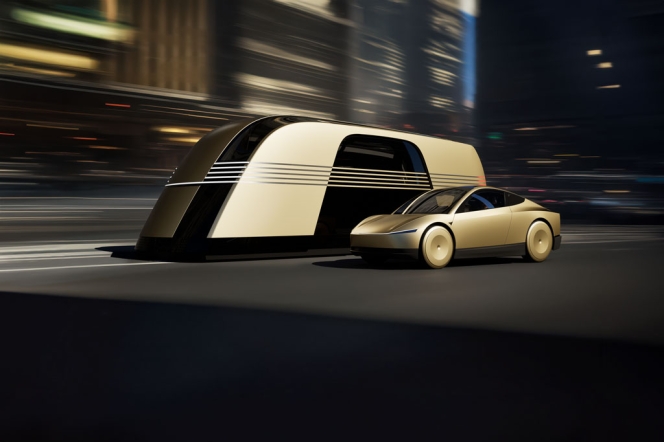
The adoption of electric vehicles (EV) in India is poised to see a boost in adoption numbers driven by a rapidly expanding charging network, growth in battery swapping models and government policies such as the PM e-drive.
The respective sector demonstrated strong momentum in 2024, with total sales reaching nearly 1.95 million units across segments. Industry experts see this growth trajectory continuing into 2025, supported by expanding charging infrastructure, battery swapping networks and favorable government policies.
Alluding to the performance of the sector in 2024 ICRA Corporate Ratings Senior Vice President Srikumar Krishnamurthy said, “Electric vehicles in India continued to gain traction in 2024 supported by factors like government incentives, changing consumer needs new product launches, technological advancements, etc. Nevertheless, the EV penetration levels remain modest, particularly in cars and trucks, though adoption in two-wheelers and three-wheelers and buses is better. The government’s policy measures remain supportive; the PM e-drive scheme is expected to aid faster EV adoption apart from the development of the EV manufacturing ecosystem. While the transition is gradual, the EV sector holds promise as a cornerstone for sustainable mobility, with significant growth potential in the coming years."
According to data from Vahan Dashboard 19,48,957 EVs were sold between January and December 2024. Electric two-wheelers dominated the market with sales translating to 1.2 million units followed by the three-wheeler segment that sold 6,94,466 units.
Meanwhile, the electric car segment continued to show steady progress with 99,848 units sold while the electric-bus sales experienced substantial growth increasing by 39% in CY2024, reaching 3,834 units.
Ola Electric dominated the two-wheeler segment with a 35.42 percent market share followed by TVS (19.49 percent), Bajaj (16.58 percent), Ather (11.08 percent) and Hero (3.78 percent).
In the three-wheeler passenger segment, Mahindra Last Mile Mobility led with approximately 10 percent market share, while Bajaj Auto demonstrated exceptional growth. The three-wheeler cargo segment saw Mahindra LMM maintaining leadership with about 11 percent market share, while Bajaj Auto showed impressive growth to capture 4.7 percent market share.
In the electric car segment, Tata Motors maintained dominance with roughly 62 percent market share, followed by MG Motor India at 22 percent, Mahindra & Mahindra (7 percent), BYD (2.85 percent), and PCA (2.19 percent), while in the electric bus segment, Tata Motors retained its leadership position with all major players showing significant sales growth.
2025 Outlook
Alluding to the sectoral outlook for 2025, Altigreen Propulsion Labs Chief Executive Officer Amitabh Sharan noted, “The electric vehicle industry in India stands at a transformative crossroads in 2025, with the market projected to reach USD 235 billion by 2030 at a remarkable CAGR of 49 percent. The sector will witness remarkable growth (especially in commercial vehicles) in 2025, driven by a combination of TCO benefits, technological advancements for better quality vehicles and driveability, and changing consumer perception towards EVs. However, the road to widespread EV adoption will need to overcome significant challenges viz-a-viz innovative vehicle financing, urban charging infrastructure, consistency in policy and regulatory framework, supply-chain localisation (for price parity with ICE) and very importantly skill development through industry-academia partnerships.”
Revfin Founder Sameer Aggarwal said, “2024 has been a defining year for India’s automotive sector, marked by accelerated adoption of electric vehicles, advancements in sustainability, and the integration of innovative technologies. Building on this momentum, 2025 is expected to be a year for EV adoption. With an intensified focus on developing robust EV charging infrastructure and scaling up battery-swapping networks, transitioning to electric mobility will become more seamless for consumers. Coupled with innovative financing models and targeted efforts to reach underserved markets, the industry is set to overcome accessibility barriers and make sustainable mobility a reality for all. Collaboration between automakers, policymakers, and technology providers will ensure a cohesive ecosystem, enabling India to lead the way in sustainable and inclusive mobility solutions.”
Godawari Electric Motors Director Hyder Ali Khan noted, “As we look ahead to 2025, we are excited about the robust expansion of our Eblu product portfolio, catering to the evolving needs of our customers. Additionally, we have some promising public and private orders in the pipeline, which will further accelerate our growth trajectory. We remain committed to driving innovation and sustainability in the EV sector and look forward to continued collaboration with our stakeholders to shape a cleaner and greener future for mobility.”
Zypp Electric Chief Executive Officer Akash Gupta revealed plans for 2025 along with the sector outlook and stated, “Looking ahead to 2025, Zypp Electric is committed to deploying 200,000 electric vehicles across the country in the next 12-18 months and we will double down on innovation, fleet expansion and partnerships to meet growing demand. We will focus on bolstering EV charging infrastructure, enhancing intelligent fleet management, and contributing to India's net-zero goals. Together, we aim to revolutionise last-mile logistics and make green mobility the norm for businesses and communities alike.”
On the components front, Automotive Component Manufacturers Association Director General Vinnie Mehta averred, “The Indian auto component industry is poised for robust double-digit growth in FY25, driven by strategic efforts to reduce import dependence and bolster exports. The electric vehicle component segment is witnessing remarkable year-on-year growth, propelled by the surging demand for sustainable mobility solutions. Key drivers include advancements in electric powertrains and battery systems, supported by increased investments in localization, R&D, and progressive government policies. These developments underscore the industry’s commitment to innovation, self-reliance, and establishing India as a prominent global manufacturing hub."
As India furthers its journey towards carbon neutrality within the mobility sector, EV adoption is slated to accelerate even in the luxury car segment. According to a news report citing Federation of Automobile Dealers Associations, the luxury EV market grew by 6.7 percent in 2024 despite decline in sales.
BMW witnessed the highest sales followed by Mercedes Benz India, Volvo, Audi and Porsche.
Image for representative purpose only
- VinFast
- Investor of the Year
- Urban Electric Vehicle of the Year
- VinFast VF 7
- Motor Vikatan Awards 2026
VinFast Wins Dual Honours In India For Investment And Electric SUV
- By MT Bureau
- January 31, 2026
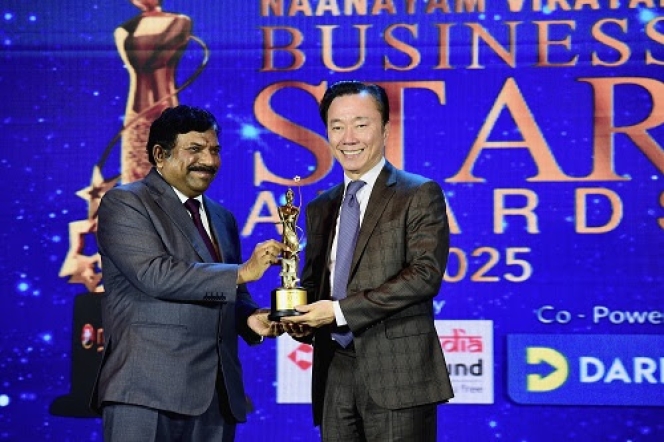
VinFast’s strategic progress in India has been further validated through recent accolades from the influential Vikatan Group media network. The company was distinguished with two significant awards: one recognising its substantial investment commitment, and the other honouring its VF 7 model as the premier urban electric vehicle for 2026. These commendations underscore the brand’s deepening integration into the Indian automotive sector, highlighting both its industrial strategy and its product relevance.
The title of Investor of the Year, conferred by Nanayam Vikatan business magazine, specifically acknowledges VinFast’s landmark commitment to establishing an electric vehicle manufacturing facility in Thoothukudi, Tamil Nadu. This project is noted not only for its scale and strategic clarity but also for its anticipated role in fostering a new industrial corridor, generating employment and bolstering the local supplier network. It aligns with national initiatives like Make in India and reflects confidence in the region’s manufacturing potential.
Concurrently, the VF 7 electric SUV was named Urban Electric Vehicle of the Year at the Motor Vikatan Awards 2026. This recognition from automotive experts underscores the model’s successful adaptation to India’s urban driving conditions, balancing design, performance, safety and comfort. It serves as a testament to VinFast’s product development focus and its localisation strategy aimed at meeting specific market demands.
As a respected media institution in South India with a legacy dating to 1926, the Vikatan Group’s awards carry considerable weight among businesses and consumers. These latest honours add to a growing list of VinFast’s achievements in the market, illustrating the convergence of its investment, manufacturing, and product efforts. Within a short timeframe, the company has employed a long-term strategy encompassing manufacturing, retail, charging infrastructure and after-sales services. Through this comprehensive approach and a focus on sustainable innovation, VinFast is steadily building its brand presence while contributing to India’s transition towards green mobility.
Pham Sanh Chau, CEO, VinFast Asia, said, “Being recognised in two important award categories demonstrates how VinFast is steadily building its position in India, not only through long term investment commitments but also through products developed to match local conditions and user needs. This recognition provides further momentum for us to accelerate implementation, expand the electric vehicle ecosystem, and maintain a long-term partnership with the Indian market.”
B Srinivasan, CEO, Vikatan Group, said, “VinFast India represents the new-age investor – bold in vision, swift in execution and deeply aligned with India’s growth story. By unravelling the true potential of the port city of Thoothukudi, VinFast India has helped create a conducive industrial ecosystem, played a positive role in employment generation and restored the city’s importance on India’s manufacturing map. Their investment is not just capital at work but confidence in India’s future.”
Blue Energy Motors And HPCL Forge Nationwide Pact For Electric Truck Battery Swapping
- By MT Bureau
- January 30, 2026
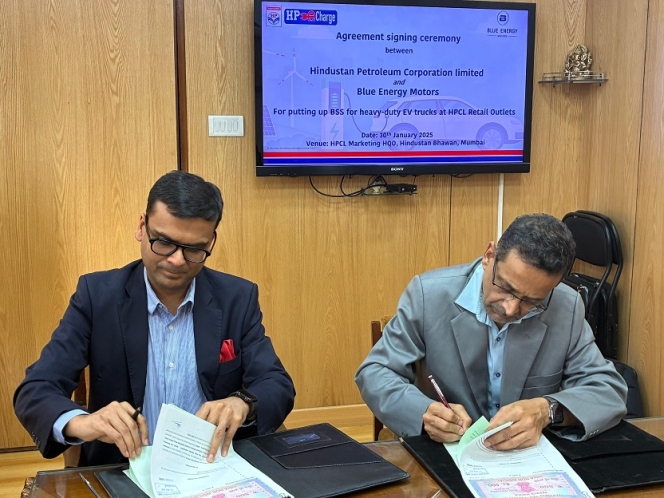
Blue Energy Motors and Hindustan Petroleum Corporation Limited (HPCL) have entered a strategic partnership to deploy Battery Swapping Stations for electric commercial trucks at select HPCL fuel outlets nationwide. This initiative leverages HPCL’s extensive network of over 24,400 retail locations to create a widespread and convenient energy infrastructure for freight operators. By situating swap stations within established fuelling hubs, the collaboration seeks to make electric mobility a practical and scalable reality for India’s logistics sector.
The core advantage of battery swapping lies in its dramatic reduction of energy replenishment time to under five minutes, minimising vehicle downtime compared to conventional charging. For fleet operators, this efficiency translates into higher vehicle utilisation, improved productivity and more predictable scheduling. Furthermore, a growing and accessible network of swap stations alleviates range anxiety, enabling electric heavy-duty trucks to confidently undertake longer routes and multiple shifts.
As India advances its green transportation goals, this alliance holds significant strategic value. HPCL’s vast retail footprint, which already supports over 5,400 EV charging points under its HP e-Charge brand, offers a ready platform for rapid infrastructure deployment across key freight corridors. Blue Energy Motors, a pioneer in zero-emission freight solutions, brings its expertise in electric commercial vehicles, exemplified by its launch of India’s first electric freight corridor. Together, the companies aim to accelerate electric vehicle adoption by directly addressing the operational needs of commercial fleets, thereby strengthening the long-term development of sustainable freight transport in the country.
- Eicher Trucks and Buses
- VE Commercial Vehicles
- VECV
- India Book of Records
- IBR
- Eicher Pro X
- Vinod Aggarwal
- SS Gill
- Abhishek Chaudhary
Eicher Pro X EV Completes Kashmir To Kanyakumari Journey In 6 Days
- By MT Bureau
- January 28, 2026
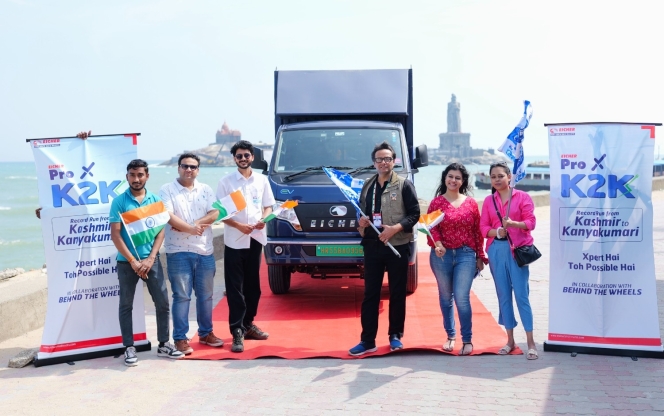
Eicher Trucks and Buses, part of VE Commercial Vehicles (VECV), has completed a journey from Kashmir to Kanyakumari using its Eicher Pro X EV.
The record verified by the India Book of Records (IBR), saw the electric vehicle cover over 4,000 kilometres in 6 days under loaded conditions. The run commenced in Srinagar on 20 January 2026 and concluded in Kanyakumari on 26 January 2026, traversing the Himalayas, plains and the Deccan Plateau.
Throughout the expedition, the vehicle utilised public chargers located via the MyEicher App. An adjudicator from the India Book of Records accompanied the truck to monitor route compliance, load, distance and charging stops. The mission served as a demonstration of electric vehicle endurance across diverse altitudes and climates to validate the technology for logistics corridors.
The journey was intended to show that electric commercial vehicles can operate beyond short-haul deliveries. By maintaining performance across hilly and coastal routes, the Pro X EV aimed to establish total cost of ownership (TCO) benefits and maintenance predictability for fleet operators. The successful completion of the route suggests that current charging infrastructure can support long-haul electric freight movement.
Vinod Aggarwal, MD & CEO, VE Commercial Vehicles, said, “For more than four decades, Eicher trucks and Buses have earned customer trust through leadership in fuel efficiency and application-specific engineering. The record-setting performance of the Eicher Pro X reinforces our unwavering focus on application excellence, reliability, and performance, anchored in robust product development and manufacturing capabilities, and enabled by a customer-centric, pan-India commercial and dealer network. I commend the entire Eicher team for achieving these well-deserved records”.
SS Gill, Chief Commercial Officer, VE Commercial Vehicles, said, “By covering the K2K route with a loaded Pro X EV, Eicher Trucks & Buses has proven that electric mobility is no longer restricted to short-haul, ‘last-mile’ deliveries. We are not just setting records, but through the strength of our service network and extensive dealer set-up, we are demonstrating that our EV technology is commercially viable, reliable, and has the range to serve as the backbone of India’s green logistics corridors”.
Abhishek Chaudhary, SVP – SCV Sales & Marketing, VE Commercial Vehicles, said, “The Eicher Pro X EV was put to the ultimate test – covering over 4000 kilometres across diverse climates and challenging altitudes. With this recognition from the India Book of Records we’ve moved beyond our own stringent testing benchmarks to real-world validation - Demonstrating that Eicher Pro X EV is a dependable partner for logistics movement across varied operations in India”.
- Montra Electric
- Murugappa Group
- PM E-Drive Scheme
- Rhino 5538 EV 6x4 Tractor trailer
- Narendra Modi
- H D Kumaraswamy
- Arun Murguappan
- Sathia Raj
- UltraTech Cement
Montra Electric Becomes First OEM To Receive PM E-Drive Certification For Heavy Trucks
- By MT Bureau
- January 28, 2026
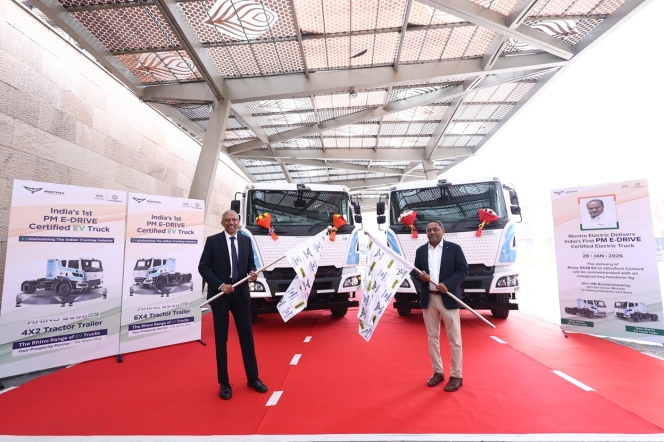
Montra Electric, the electric medium and heavy commercial vehicle business of the Murugappa Group, has become the first manufacturer in India to receive certification for heavy-duty electric trucks under the government's PM E-Drive Scheme.
To mark the achievement, the company delivered a Rhino 5538 EV 6x4 Tractor trailer to UltraTech Cement. The handover took place in the presence of Arun Murugappan, Chairman of Montra Electric and Sathia Raj, Chief Procurement Officer of UltraTech Cement.
The PM E-Drive scheme includes a budget of INR 5 billion specifically for electric trucks, providing a benefit of up to INR 960,000 per vehicle for the Rhino 5538 EV. This incentive is intended to lower operating costs and reduce exposure to fuel price volatility for fleet operators in the logistics, mining, and manufacturing sectors. The Rhino 5538 EV range is designed for Indian conditions and is available in 6x4 and 4x2 variants.
The Rhino 5538 EV 4x2 variant features a 282 kWh LFP battery that produces 380 HP and 2000 Nm of torque. It offers a range of approximately 198 km under standard test conditions and supports six-minute battery swaps. These specifications suit the vehicle for high-utilisation applications in ports, steel plants, and cement logistics.
H D Kumaraswamy, Union Minister for Heavy Industries, said, "The PM E-Drive scheme is a testament to the growing prowess of Indian innovation in the heavy-duty electric vehicle segment. Under the visionary leadership of Prime Minister Narendra Modi, we are committed to decarbonizing our logistics and making India a global hub for EV manufacturing. Electric trucks are pivotal to our Net Zero goals, and by fostering a self-reliant ecosystem through such certifications, we are driving the spirit of Atmanirbhar Viksit Bharat. We are very happy to see our Prime Minister’s vision coming to life with the 1st PM E-Drive certified heavy duty electric truck from 'Montra Electric' getting delivered today."
Arun Murugappan, Chairman, Montra Electric, said: “Decarbonising freight is one of the most critical challenges in India’s energy transition. We are grateful to the Government of India and our Prime Minister Narendra Modi for introducing forward-looking and progressive policy frameworks such as the PM E-Drive Scheme, which represent a welcome and transformative step in accelerating this shift, particularly in heavy commercial vehicles where emissions intensity is high. At Montra Electric, we are proud to contribute to this national mission by delivering technologically advanced, reliable, and scalable electric M&HCV solutions that can drive meaningful and lasting change in India’s mobility ecosystem.”








Comments (0)
ADD COMMENT